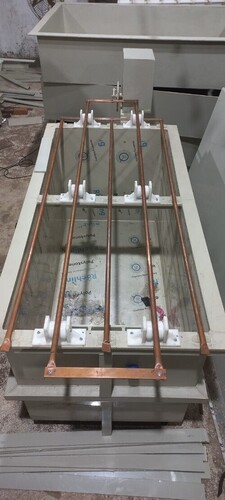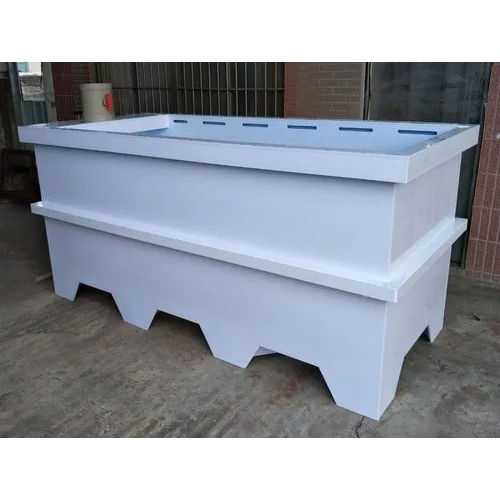About
Our Polypropylene (PP) tanks are designed specifically for the electroplating industry, known for their high chemical resistance and durability. Made from high-quality thermoplastic polymer, these tanks effectively handle a variety of acids, alkalis, and solvents commonly used in electroplating processes. Their lightweight design simplifies transportation and installation, making them a practical choice for businesses.
Technical Specificat Material: High-grade Polypropylene (PP) Chemical Resistance: Excellent resistance to corrosive substances, including sulfuric acid, hydrochloric acid, and sodium hydroxide. Temperature Tolerance: Can withstand temperatures up to 100C, suitable for most electroplating applications. Design Options: Available in cylindrical, rectangular, or custom shapes to meet specific industrial needs. Construction Standards: Built to strict industrial standards, using advanced welding techniques like hot air welding, butt welding, and extrusion welding for superior structural integrity. Testing Methods: Ensuring leak-proof performance and compliance with safety regulations.Capacity Options: Available in various sizes, from 50 liters to several thousand liters, catering to different operational needs.
Applications:
PP tanks are ideal for: Electroplating: Suitable for plating metals such as zinc, copper, and nickel. Chemical Processing: Used in automotive, electronics, and metal finishing industries. General Chemical Storage: Perfect for environments requiring high resistance to corrosion.
Industrial Standards:
Our PP tanks adhere to recognized international standards, ensuring quality and safety:
FAQ Polypropylene (PP) Tanks
Q1: Why are Polypropylene (PP) tanks preferred for electroplating?
A1: PP tanks offer excellent chemical resistance to the acids and solvents used in electroplating, combined with a lightweight design that facilitates easy handling and installation.
Q2: What is the temperature tolerance of PP tanks?
A2: Our PP tanks can tolerate temperatures up to 100C, making them suitable for a wide range of electroplating processes.
Q3: How do you ensure the quality and safety of PP tanks?
A3: Each tank is rigorously tested using hydrostatic pressure tests, vacuum tests, and air pressure tests to guarantee leak-proof performance and safety compliance.
Q4: Can PP tanks be customized for specific applications?
A4: Yes, we offer customization options for tank size, shape, and capacity to fit specific industrial needs, ensuring optimal performance in your application.
Q5: What maintenance is required for PP tanks?
A5: PP tanks require minimal maintenance. Regular visual inspections and checks for wear in high-stress areas are generally sufficient to ensure long-lasting durability.
Q6: Are Polypropylene tanks suitable for long-term chemical storage?
A6: Absolutely! PP tanks are designed for long-term storage of corrosive chemicals without degradation, ensuring safety and reliability over time.
Q7: How do PP tanks compare to PVC or FRP tanks?
A7: While PVC tanks are more affordable, PP tanks offer superior durability and flexibility for higher temperatures. FRP tanks are stronger and customizable but generally come at a higher cost.


Price: Â
- 50
- 100
- 200
- 250
- 500
- 1000+
மேலும் Products in பிபி தொட்டி Category
எலக்ட்ரோபிளேட்டிங் பிபி
விலை அலகு : அலகுகள்/அலகுகள்
கலர் : சாம்பல்
பயன்பாடு : தொழில்துறை
அளவின் அலகு : அலகுகள்/அலகுகள்
தயாரிப்பு வகை : பிபி தொட்டி
விண்ணப்பம் : தொழில்துறை



 விசாரணையை அனுப்பு
விசாரணையை அனுப்பு எஸ்எம்எஸ் அனுப்பவும்
எஸ்எம்எஸ் அனுப்பவும்
